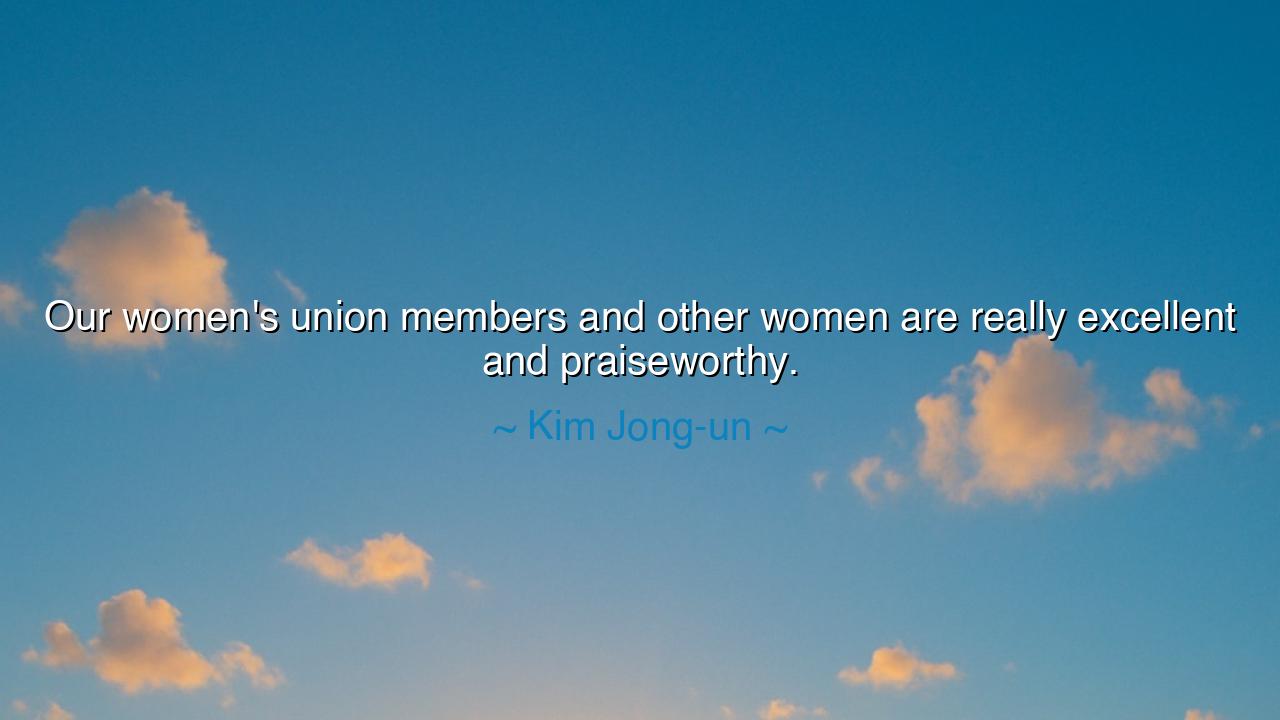
Our women's union members and other women are really excellent






The words of Kim Jong-un, “Our women’s union members and other women are really excellent and praiseworthy,” are more than a simple compliment. They reflect the ancient recognition that the strength of a nation is not borne by men alone, but by the tireless labor, sacrifice, and devotion of its women. In times of hardship and struggle, it is they who carry the weight of families, who labor unseen, and who form the moral backbone of their people. To call them praiseworthy is to affirm that their hidden strength is worthy of honor and remembrance.
In the ancient spirit, this truth is as old as civilization itself. When armies marched and kings fought, it was the women who tilled the fields, raised the children, and preserved the memory of the people. Without their courage, nations would have crumbled from within. By praising the women’s union members, Kim Jong-un follows the long tradition of rulers who sought to bind the loyalty of their people by exalting those who labored most faithfully behind the scenes.
History bears witness in the time of the Great Patriotic War of the Soviet Union. While men fought on the front lines against invasion, countless women labored in factories, drove trains, tended the wounded, and even fought as soldiers themselves. When victory was won, it was acknowledged that without their devotion, the nation would not have survived. This parallels the sentiment in Kim’s words: the recognition that women are not ornaments of society, but pillars of its survival.
Yet, within such declarations also lies a tension. Too often, leaders have praised women publicly while confining their roles privately, granting honor in words but denying equality in power. The praiseworthy labor of women is celebrated, but their voices in decision-making are often restrained. The recognition of worth is real, but incomplete, pointing to the paradox of a world that needs women yet hesitates to free them fully.
So let this teaching endure: the excellence of women is not a gift granted by rulers, but a truth rooted in their very being. Their strength, sacrifice, and perseverance are the silent engines of nations. When leaders, whether sincerely or strategically, proclaim them praiseworthy, they echo an eternal truth—that no people can endure without honoring the women who sustain them. And let future generations go beyond praise, granting not only words of honor but the power and freedom long deserved.






NHNguyen Hoa
The praise of women by Kim Jong-un raises an important question about how women's achievements are acknowledged in totalitarian regimes. Are women in North Korea really empowered, or are their roles and accomplishments shaped by the state's agenda? How much freedom do they have in contributing to society, and what does it mean for their futures when such praise comes from a leader with so much control over their lives?
PVPhan Van
While Kim Jong-un's words may seem supportive, one must wonder if they reflect genuine gender equality or merely a facade. How do women's roles in North Korea compare to those in other countries? Are they truly free to pursue their own ambitions, or are they still confined to the state’s idealized image of womanhood? Does this praise mean real change for women, or is it just symbolic?
NN24 Nguyen Ngoc Nhi
Kim Jong-un’s comment about women being ‘excellent and praiseworthy’ could be seen as a gesture of support, but is it really reflective of gender equality? How are these women treated in comparison to men in practice? The statement seems to overlook deeper questions of empowerment, agency, and equality. How can we ensure that praise translates into real progress for women, especially in such a tightly controlled society?
TTQuyen Tran Thuc
It’s interesting that Kim Jong-un acknowledges the excellence of women in his country, but can we take such statements at face value? In a tightly controlled regime, how much of this praise is authentic and how much is influenced by the need to project a specific image? Are the women truly in positions of influence and recognition, or are they simply fulfilling roles assigned by the state?
TNTho Nguyen
Kim Jong-un's praise of women's union members seems to celebrate their contributions, but is it really genuine or more of a political statement? It’s important to consider how women are represented in the public sphere. Are these words meant to inspire real empowerment, or are they part of a larger narrative designed to portray the regime in a positive light? How much freedom do these women actually have in their roles?